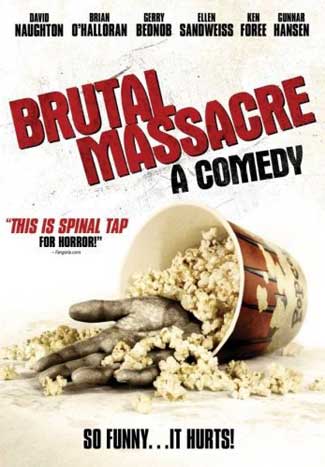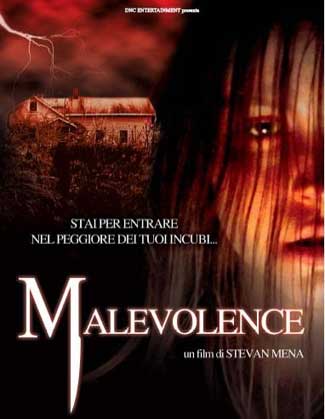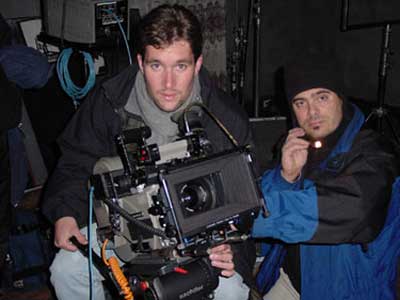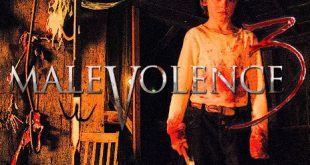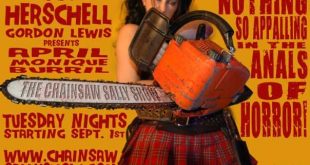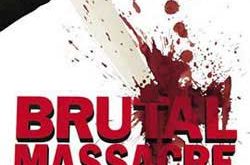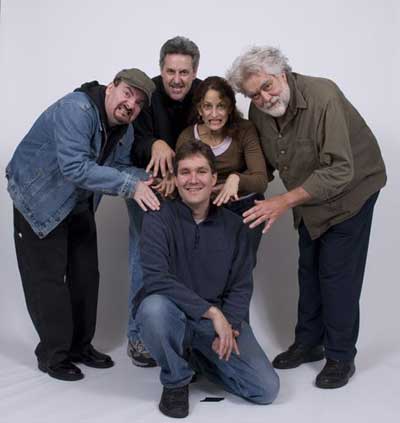 The art of mingling horror and comedy together is more subtle than one might think, despite the slapstick ease of say, Evil Dead II or even Lou Costello and Bud Abbott shambling against a Universal goon squad. Some horror films are inherently dark and serious, though yielding bursts of perfectly-timed humor, as An American Werewolf in London did with glorious pastiche.
The art of mingling horror and comedy together is more subtle than one might think, despite the slapstick ease of say, Evil Dead II or even Lou Costello and Bud Abbott shambling against a Universal goon squad. Some horror films are inherently dark and serious, though yielding bursts of perfectly-timed humor, as An American Werewolf in London did with glorious pastiche.
Brutal Massacre, in case you’re late to the show, is both a subtle and direct parody of not only the horror genre, but the practice of filmmaking itself. Its director Stevan Mena used Brutal Massacre as a bit of an outlet for the trials and tribulations he experienced while filming 2005’s Malevolence. After all he underwent to make that film, to come back and torch his demons in Brutal Massacre in Monty Python-esque fashion (as Stevan anecdotes) shows remarkable character. Doing it in the company of such established genre leaguers such as Gunnar Hanson, Ellen Sandweiss, Mick Garris and Ken Foree adds to the cult aspect of a little indie film destined to grow as a future phenomenon of culture clash comedy.
Stevan took some time with Horror News.net to give us more insight into the wacky microcosm of Brutal Massacre…
Originally you were reported to have done a bunch of short films as early as age 11 with your brother and friends. Everyone has their humble beginnings and all, but wow, man, age 11? Tell us about some of these films you guys did, and what ended up being the most fun as well as the most ridiculous to watch now in your older years?
Making films was my recreation. There’s no rules when you are a kid, so most of the films I made are pretty silly and unwatchable. Things like The Killer Sneaker, Super Vishnu (India’s version of Superman), lots of improv nonsense, but it gave me an appreciation of film that has never waned. What fascinates me about it is the window into the past it creates. No matter how much time passes, I can turn on these films and I can be 12 years old again, and when I look back at my work, I can see my progress through the years. Doing it professionally, it’s really satisfying to create something that can be shared globally. Traveling to other countries and seeing your film on a shelf in a language you don’t understand is a trip.
Having had a taste of the movie life this past summer while playing a zombie in an indie horror film, I found myself watching the director quite a bit and trying to figure out his own motivations for doing that kind of a film with the uncertainty of it banking, so to speak. Obviously you’ve been driven to be a filmmaker for most of your life, so what do you feel has been your personal motivation in your film work?
I’m motivated by the entire creative process. Writing something, and then trying to capture those images on film is an impossible challenge, and it’s the possibilities that process creates that excites me and pushes me on. It never gets boring, and it’s very addictive. I’m sure everyone has their own personal influences that make it onscreen, I’m no different. But the fact that I like doing horror films is not so much a reflection on my personality than of my interests in the way this genre affects the viewing experience. Watching a horror film is different than any other film; it creates a totally different emotional response, and if done right, can be very influential. I think this is why these types of movies are so popular.
Prior to doing Brutal Massacre you created Malevolence literally from scratch using your own resources, fundraising skills and talents to get the job done. Add to that, the mishaps related to the film such as the car crashing and the actor’s aneurism. Needless to say, you got to exorcise some of these demons with Brutal Massacre! Tell us about the hardships of doing Malevolence.
That’s more of a book than an interview question. In fact there is a book out there called How to Make an Independent Horror Film by Sara Cauldwell that dedicates an entire chapter on what can go wrong, based on Malevolence. What I will say is that as I look back now, everything that went wrong was not due to bad decisions on our part, it was just how the penny landed. Murphy’s Law just settled in and didn’t go away. Everything that could have broken did, every car crashed, the lab ruined film, the set got robbed. It’s kind of silly in retrospect now. Whatever force was with us was having a real laugh at our expense, but the film was eventually a minor success, so at least we got something back for our suffering.
I have to say Brutal Massacre is far classier in its comedic subtleties than say, the Scary Movie films. While the latter are natural cash cow theater fillers, Brutal Massacre is far more sophisticated (Ellen Weiss taking a sh*tbath notwithstanding) than those big studio mock-ups. Do you ever gnash your teeth that films like the Scary Movie series hold more commercial appeal over a zany indie film like Brutal Massacre?
No, I am very aware that most people like their comedy simple and lowbrow. I just happen to like understated comedy. I’m half British so I guess that kind of snobbish humor is inbred somewhat. What’s great about that kind of humor is it gives you an out if people don’t find it funny. You can just turn around and say, Oh well, I guess the jokes were just too sophisticated for your tastes. I’m a huge fan of Christopher Guest’s work, and the timing of the humor, and the space I give it to breathe is reminiscent of that type of comedy. To each their own. Hey, I went for some cheap laughs too, so I’m guilty myself. Brutal Massacre is the kind of movie that seems to work well with a big audience, so DVD isn’t really the best way to view it unfortunately, so in a way I do wish it had some more mainstream appeal to it.
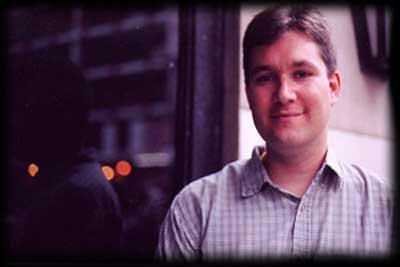 It’s sometimes hard to merge comedy and horror where one might normally find the genres amicable bedpartners. We can define the horror spoof by terms of Student Bodies or Evil Dead 2 or Sleepaway Camp 2: Unhappy Campers or especially Shaun of the Dead and each are pretty riotous in their own fashion. For Brutal Massacre’s purposes, the concept could’ve easily backfired in your face but the “mockumentary” format of the film lends to its subliminal humor. Were you concerned along the way of filming Brutal Massacre about timing things just right to make them funny?
It’s sometimes hard to merge comedy and horror where one might normally find the genres amicable bedpartners. We can define the horror spoof by terms of Student Bodies or Evil Dead 2 or Sleepaway Camp 2: Unhappy Campers or especially Shaun of the Dead and each are pretty riotous in their own fashion. For Brutal Massacre’s purposes, the concept could’ve easily backfired in your face but the “mockumentary” format of the film lends to its subliminal humor. Were you concerned along the way of filming Brutal Massacre about timing things just right to make them funny?
Absolutely. I rarely called the actors on their performance, but I was very strict on the timing of certain jokes. Often they didn’t understand why I was asking them to speak a certain way, or why they were not allowed to smile when someone else said something that was obviously ridiculous, but the humor doesn’t work if for a moment it seems that anyone involved in the film is “in” or aware of the joke. We laugh at these characters because they are not aware of just how ridiculous they are.
I have to consider Brutal Massacre indie horror’s answer to Spinal Tap as we follow Harry Penderecki’s misfortunes in getting that last great horror epic in the can. Did Spinal Tap come into play in your mind for this film? The crew casualties alone!
You can’t make a mockumentary without thinking about the film that really kind of started it all. There’s a lot of truth in Spinal Tap, ask any musician. I think that’s why Brutal also works, because a lot of it is based on things that actually happened. “You can’t make this sh*t up” was a common phrase on Malevolence when things went wrong. Plus, Harry is based on a combination of people I’ve met in the industry. There are a lot of really strange people in this industry who truly believe they are the Orson Welles of the horror genre, and I can tell you that being a fly on the wall when these people pontificate about their work is funnier than anything Harry says.
(laughs) I also can’t help but think of The Out-of-Towners where everything that could possibly go to hell in one long sequence of events does. Is that zany and fate-driven flavor something you were reaching for with Brutal Massacre?
Every filmmaker at one time or another has that reflective moment where they wonder if it’s all worth it, meaning the struggle and sacrifice. I needed to demonstrate how even someone as persistent and driven as Harry could reach that tipping point of giving up. Nothing is more touching than watching someone’s dreams be shattered. It makes for good drama. As ridiculous as Harry is, I can’t help but feel sorry for him when it all comes crashing down, but it makes it all the more satisfying when he ultimately triumphs against insurmountable odds.
David Naughton really nails the part of Harry who is so damned absorbed with himself and his “legend” as a B-movie director it’s so Robert Zemeckis or Mel Brooks-ish to poke fun at the guy onscreen and routinely make him the butt end joke—maybe it’s not good to be the king sometimes! What trait of Harry’s do you feel best satirizes the Napoleonic director’s syndrome Harry exudes?
Harry is kind of like the captain in Moby Dick. I even use his director’s viewfinder to mimic the captain searching for the whale. It is a visual metaphor for Harry’s unwillingness to give up, even though everyone around him thinks he’s crazy. Harry, even though he has a good heart, is willing to sacrifice anything or anyone as a means to an end of getting the film in the can. He’ll love you like a brother, but if tossing you under a bus means he can shoot a few more days, look out.
The spoofing of nudity in Brutal Massacre is hilarious as well, whether you’re talking about actresses under contracts to show “x” amount of skin, or simply the fact Harry is forced to use nudity when he wants to go out with a “classy” picture sans bare breasts. Did getting the actresses in Brutal Massacre to flash come with similar stories?
Well, those moments are kind of personal for an actress and I wouldn’t betray that, but I will say that life can sometimes imitate art. Often agreeing to do nudity is easy until the day comes to do that particular scene, but I just tell them to pretend I’m their doctor. A good rule of thumb is to ask them to disrobe during the audition. If they can’t do it there, they probably can’t do it in front of 20 crew people either.
Gathering a supporting ensemble of horror icons like Ellen Sandweiss, Gunnar Hanson, Mick Garris and Ken Foree to hang out in this thing I’m sure was rather special for you. The message of unity from these legends only adds to Brutal Massacre’s appeal. Aside from horror savantism, what do you feel this crew did for Brutal Massacre as well yourself while filming it?
The cast lends authenticity to this film, and the movie couldn’t exist without them. I was very blessed to have the full support of all the cast involved, which allowed me to experiment and try things. They were all great sports, nd when things got rough, especially with the weather (0 degrees for two weeks), everyone banded together. I was really impressed with the incredible comedic talent and timing everyone demonstrated. I would be thrilled to work with each one of them again in the future.
I think of Harry’s incessant yelling at flubbed lines and the jeep that continuously crosses onto his sets similar to Daffy Duck’s flustered “Makeup!” shouts in the Looney Tunes short where he’s a stunt double for Bugs Bunny. Since there’s a bit of your own experiences behind Harry Penderecki, have you had similar moments in filming where you’ve popped your cork like that? What can you remember as being the most obnoxious interruption or spoiled take in your career to-date?
I’m actually known for being very calm on my sets, no matter what is happening. Some people have even asked why I don’t freak out sometimes, but my demeanor as the director sets the tone for the entire crew. If I lose it, then it’s all downhill from there. However, there was one time where I did blow my top. Some guy who was hanging around the set was taking photographs supposedly for a local newspaper. We were very gracious about it until he stepped into a shot while we were rolling and began snapping away. He ruined a take, and I was amazed at the hubris and lack of respect this guy showed and I had him physically removed. It’s the closest I’ve ever come to punching somebody in the face.
(laughs) I applaud your restraint! Those fictitious movie titles of Harry’s select “best” like Sasquatch at the Mall, Bowel Movement, People Pesticide, I’ll Take the Ring…and the Finger Too and of course the blunt Eat Shit and Die are so insane you wish such things were really at the video store to purchase. Where in the world did you come up with this stuff?
A lot of those titles came from song titles from a band I was in back in the day. It was a thrash band that kind of poked fun at thrash, and some of their ridiculous titles for songs. It was all a goof, we called ourselves the Thugs of Thrash. We had several albums, the last one was a compilation called the Thugs Greatest (S)hits. We broke up just before we were about to go on the road. When I was looking for titles for Harry’s movies, I found inspiration from those songs we wrote. In fact, the song for “Garbage Man” was the actual original recording we did. It was just me singing and my friend Don Daly on guitar recorded on a small 20 dollar tape recorder. We used the same old recording in the movie. As you can hear, I’m a terrible singer.
Bringing up Mick Garris again, I was thinking of some of the chapters of his book Development Hell in the way Harry is essentially given one last shot at impressing Hollywood and having the potential of a fickle and jaded entertainment society flush him away as irrelevant. Was this something you and Mick discussed at all, or is there any concern on your part where relevance in moviemaking has a slim threshold?
Every movie is kind of like your last shot. Hollywood is like anything else: what have you done for me lately? You’re only as good as your last piece of work. But your image can carry you a long way, and people’s perception of you can go a long way in the industry. Mick had some insightful encouragement for me as an artist, and I look back at my meeting him as a turning point for me. A lot of his advice resonated and I consider him a great friend and mentor. I think if I had a weighty professional decision to make and needed advice, he would be my first call. I know I would get an honest answer. So many of the people I’ve met in the business have such a personal agenda that it’s hard to get to know them. Mick was such a regular guy, it was eye opening to see someone who has reached the level of success he has be as approachable and open. Those types of contacts can help remove some of the fear you have about your chosen field, especially one as unforgiving as movies.
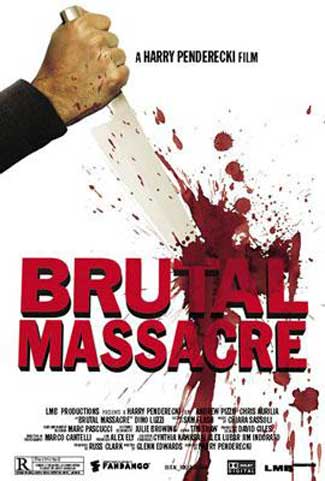
I recall you mentioning disappointment at Brutal Massacre’s DVD release. What happened?
We showed Brutal at dozens of venues and each screening was so well-received that we thought we had a monster hit on our hands. I guess I was just hoping for more support all around than it received. I read online at a pirate file sharing group that users were thankful they could illegally download Brutal because they couldn’t fid it in stores anywhere. Anytime you have people saying the only way they can see your movie is to download it illegally, that kind of takes the wind out of your sails—or is it sales?
Ye bang. In the end, do you feel anyone who didn’t get on board with this film is going to stumble upon it one day and discover its charms as so frequently happens in various media?
I do. I think the film can stand the test of time because it’s honest, and I think people respect that.
So there will be a sequel on your horizon, Malevolence: Bereavement, as well as a supernatural thriller you’re at work on, Transience. Tell us what you can about these projects and do you feel after doing a knucklehead film like Brutal Massacre, it’s going to take a little readjustment into doing serious horror?
Not at all. It’s as easy as going from happy to angry. I did Brutal to offset the ugly reaction I know I’m going to get from Bereavement. It’s a very dark and evil film, and it was very difficult to shoot. I know the Ratings Board is going to rip it to shreds just to get an R rating, so I’m trying to pre-empt that. I don’t know how this film can see the light of day without an NC-17 rating, so it’s caused a lot of delays in the post process. Still, I’m definitely in horror mode now. Transience, on the other hand, is a supernatural thriller, a huge diversion from the horror I’ve been doing, and something very different for me. I look forward to always changing.
 Horror News | HNN Official Site | Horror Movies,Trailers, Reviews
Horror News | HNN Official Site | Horror Movies,Trailers, Reviews
